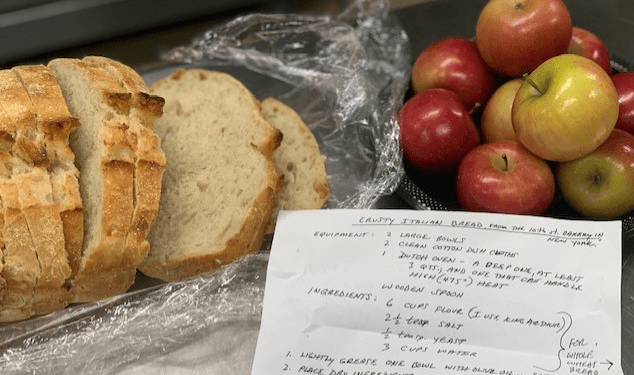
Among many volunteers, a retired Bridgwater State University professor baked bread for distribution through his local COA.
The Gerontology Institute’s Center for Social and Demographic Research on Aging is publishing a series of blog posts to follow the ongoing impact of the coronavirus pandemic on Councils on Aging across Massachusetts. We encourage COA readers to tell us about their experiences or responses to blog posts by using the reply box at the bottom of each post.
It’s a good thing Zoom and lots of other communications technology exists these days. But the old-fashioned telephone is also playing important role in the plans councils on aging are following to keep in touch with their elder residents.
In Bridgewater, the Fire Department is assisting to help identify phone numbers from census data for over 5,000 residents who are age 60 or older. Those numbers are being used to make wellness calls, but also develop a huge database for town’s emergency response protocol.
In Billerica, volunteers are making about 150 calls each week to check in with elder residents and evaluate their needs.
“During calls to check on patrons, they are so grateful to be remembered,” said Billerica COA Director Jean Bushnell. “It was remarkable to discover that care and concerned flowed both ways, they were actually worried about our staff.”
Easthampton’s COA was staying in touch with wellness checks to about 1,100 older adults in its community. One product of an increased sense of isolation: Longer phone calls.
Online conferencing, cable television and other forms of electronic communications have certainly helped COAs reach out to their communities. But they can’t replace the impact of a simple phone call from a friendly voice, checking to make sure elders are doing all right.
A top priority: Addressing food issues
Food security, one of the most universal human needs, has prompted a wide range of responses among councils across the state.
Cost-free delivery for elders who lacked transportation was an issue in Easthampton. But the town’s COA received a grant from Highland Valley Elder Services that partially funded a grocery shopping delivery program. That made it possible to offer free delivery for orders placed at Big E supermarkets by residents over age 60 who don’t drive and meet other eligibility requirements.
In Worcester, food was more than sustenance for some of the city’s elder residents. It was a cultural issue as well.
Local Asian food markets were forced to close during the COVID-19 pandemic. “Food is important in all cultures,” said Worcester Senior Center Director Amy Waters. “We heard many concerns from Vietnamese and Chinese elders about this.”
The COA worked out a system so volunteers were able to deliver fresh fruit and vegetables those older residents prized. Later, some of the markets were able to reopen on a limited basis. “Now there are more choices available to have the comfort of flavors from home,” says Waters.
Billerica’s COA, working with the town’s public schools, organized donations of perishable and non-perishable items to make up 140 bags of food distributed to local older adults in need. Two rolls of toilet paper – perhaps the most coveted commodity of the moment — were added to each bag to create a care package and most were picked up in a drive-through arrangement.

POSITIVE MESSAGES: Barnstable’s COA is offering curbside meal service and something more for community elders. “Meal and a SMILE – Sending Messages of Inspiration, Love and Empathy” is an intergenerational program providing supportive letters and drawings from local students that are included in bags of food. “The younger generation is letting older adults know there is support,” said Barnstable COA Director Madeline Noonan. “Adults are very touched.”
Adapting to new volunteer dynamics
Managing volunteerism has become more complicated for councils on aging in the time of COVID-19.
The good news: So many people and organizations are stepping up to offer their time, services and other resources to help older residents in their communities.
In Bridgewater, a sewing group provided over 1,000 facemasks. Worcester’s Senior Center developed a “buddy program” with the UMass Medical School, where some students speak Chinese or Vietnamese, to provide elders with reassurance and referrals if necessary.
Virtually every COA has an inspiring volunteer story to tell. Putting those good intentions to their best uses will be an ongoing management priority.
But other volunteers who served previously have needed to take less active roles because they are at a greater health risk as a result of the coronavirus.
Billerica’s COA had counted on volunteers to handle about half the work load in the past. “Many of them are part of a vulnerable population and have stepped back from supporting roles,” said Bushnell. “But many new volunteers, including teachers and nurses, have stepped forward.”
Are we missing anyone?
If you know someone who would like to receive email notices about new posts, send us a note with their address to gerontologyinstitute@umb.edu and reference “COA posts” in the subject line.

June 1, 2020 at 4:49 pm
The things we are dealing with are very different. Our population is very active and the struggle we have found is isolation. We have been working through the quarantine so that the seniors in our community can call us with any questions and concerns.
There was a fair amount of confusion in March when the orders first came in. We closed to the public, yet remained in office for questions, concern, information and wellness checks. Our director had begun wellness checks immediately in March for our more vulnerable seniors, and has kept up the practice consistently.
Combating loneliness, isolation, the kind of hidden hysteria that comes with fear of the unknown has been our central focus since the beginning.